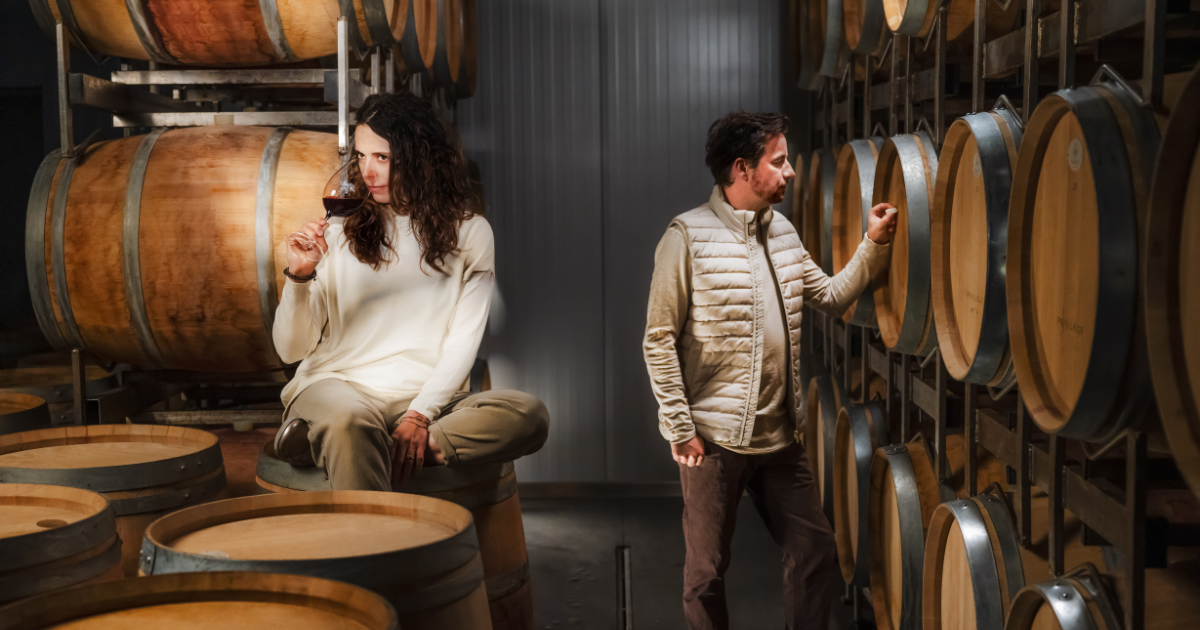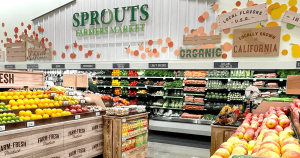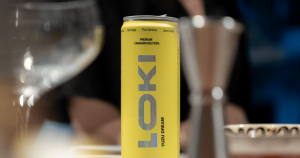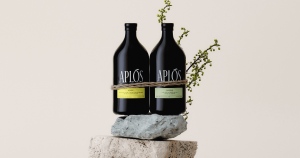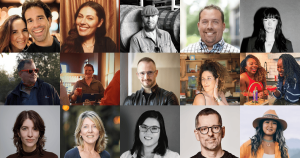Partner Content: ZERONIMO
In this interview, Patrick Bayer and Katja Bernegger, the innovative minds behind ZERONIMO, share their journey into premium dealcoholized wine. Despite their extensive background in traditional winemaking, the Austrian couple ventured into this new realm, driven by Katja’s curiosity and personal experiences during pregnancy. Patrick recognized the potential after witnessing her longing for the complex flavors of wine without the alcohol, and saw a path forward with their 98 point rated wine as the starting point.
This realization sparked a two-year journey of experimentation and development, culminating in the creation of ZERONIMO’S premium non-alcoholic wines. They faced numerous challenges, including the delicate balance of flavors after dealcoholization, but their commitment to maintaining the essence of their high-quality wines prevailed. Today, ZERONIMO stands out as a sophisticated alternative for wine lovers and flexi-drinkers alike, all while preserving the rich tradition and culture of Austrian wine.
Dry Atlas: Given your background in traditional wine, what inspired you to enter the non-alcoholic wine realm?
Katja Bernegger: In 2018, Patrick and I decided to work together at his family winery. My very first month, I asked Patrick if he would be interested in making non-alcoholic wines. I was new to the industry and thought it would be great for everyone to have access to this fascinating wine experience. Patrick hadn’t really considered it before.
Patrick Bayer: Correct. I’d worked for around 20 years trying to produce the best wines from our vineyards. It wasn’t top of mind to create the best wine, remove the alcohol, and market it under another label. It took quite some time—and the involvement of my family, now the second generation at our winery—to bring this idea to fruition.
DA: What was the turning point?
KB: My pregnancy played a really big part. When I was pregnant in 2021, I saw my chance to bring up the topic with Patrick again.
PB: It opened my eyes.
KB: Yes, it really opened his eyes because he saw how much I was suffering. I was missing the tannins, the complexity of drinking, and having stunning pairings with food. Nothing could satisfy me. This led us to research non-alcoholic wines, specifically red wines, as our winery specializes in producing them.
We tasted many others. Although some things tasted good, they didn’t match our wine’s profile. They didn’t satisfy our palates. We were searching for something dry, complex, and multi-layered. Something with tannins present. We didn’t find it. I asked Patrick if we could do it differently. With his winemaker’s heart, he said to me, “Yes, I think we can, but only if we take our best red wine.” That was the start.
PB: It was the only route I saw. If we start with the best we have and elevate it to a higher level, then maybe we’re on the right path. Otherwise, I couldn’t see much potential. My thinking was: let’s start with our 98-point rated wine, one of our most renowned wines here in Austria. We decided to take the bold approach and try it with that one.
DA: How did you start to explore dealcoholization, and what were the early challenges you faced?
KB: We asked our dear colleagues all over Europe what the outcome would be if we dealcoholized such a premium wine. Everybody looked at us and said, “We don’t know. We’ve never done it.” It was certain—we had to do it. We wanted the answer to that. Then ZERONIMO was born.
From the first test until the launch of Leonis Blend, nearly two years passed. We thought it’d be much easier than that, that the result would be 100% amazing. However, when we made the first tests, we found out that this is not the case.
In the end, the foundation is crucial, and having the highest quality wine possible is very important. But the responsibilities for winemaking and crafting a brilliant non-alcoholic wine do not end there. You’re halfway there, but the other half remains.
PB: We had to think about the whole process in a new way. As Katja said, you have to take the best of what you get, otherwise you won’t get the best out of it.
KB: Alcohol is a flavor transmitter. It has a huge part in the intensity of flavors that we can taste, sensorially. But alcohol also covers aromas. For example, when you dealcoholize, you concentrate something from 100% to, let’s say, 86%. So the acidity concentrates. But even if you were to try alcoholic wine with the same acidity, you would not experience the acidity so much on your palate. That’s mainly because alcohol covers it up.
There are other aromas within wine that you don’t associate with wine because they’re normally covered by alcohol. That was a new learning: that it’s not just a flavor transmitter. It also can cover aromas, so in dealcoholization you need to strike a delicate balance between acidity, sweetness, and the wine aromatics. The challenge was to not destroy the wine aromatics by using too much sugar or anything else. That’s actually the most complex part, to balance this out and to ensure that the dry aromatic and the multi-layeredness is still there. We use a patented aroma recovery process. It takes three to four days to extract the aromas from the alcoholic base.
The wine has character. You can taste the varieties that we use, you can taste the terroir, you can taste the vintage. Everything that a winemaker loves is something that we wanted to ensure we’re delivering, too. That was probably the biggest challenge and it took us some time. But we’re happy with where we landed.
DA: Tell us a bit more about the terroir.
PB: We work with really old vineyards. We have the typical grapes we have in Austria. It’s Blaufränkisch, it’s Zweigelt. It’s a bit of Cabernet and Sauvignon for the international feeling. As [Ocean Beach Cafe Founder] Joshua James said when he had his first taste, “Oh wow, it’s the old world in this glass of wine.” He’d never had something like that before.
This was our aim: we wanted people who are highly involved in the wine world to fall for it and say, “Oh wow, this is what I like,” because it’s niche. Here in Central Europe, dealcoholized wine is even more niche. For most people, ZERONIMO is their first encounter with dealcoholized wine, so we want to leave a great first impression.
DA: Tell us about the consumer base in Europe for non-alcoholic wine? How is Zeronimo being received there?
PB: Austria is a small country, but it boasts a very long wine tradition, much like Italy or France. Wine, and perhaps even beer, are revered almost like the Holy Grail and considered untouchable. We hope that we can stay in the middle and provide people a great wine experience, whether they don’t drink alcohol at all or are just looking for another option.
KB: To put it in a nutshell, ZERONIMO is not about replacing something. It’s about extending the range of wine that somebody can choose. Freedom of choice. It’s very funny: 70% of the people who are buying ZERONIMO at our winery in the online shop are also buying alcoholic wine.
We have “flexi-drinkers,” I would call them. They decide based on the occasion, on how they feel, on what they will do the next day. I would go even further to say it’s not a black and white thing, and we don’t see it like that. We don’t want to make the comparison because you cannot compare it. Non-alcoholic wines have flavors that are somewhat comparable to conventional wine, but they also introduce a host of new flavors that are entirely unique to them.
Think about orange or natural wines. It’s the same; you also have new flavors that you are not familiar with from conventional wines. This is great because it shows how vast the range of wine is. This is actually also something that we are aiming for. That’s also what we are seeing with those 70% who are buying ZERONIMO. The other 30% are really people who either never drank alcohol and want to know what the wine flavors are about, or are people who, for whatever reason—illness, pregnancy, personal reasons—decided to not drink alcohol anymore.
DA: Do you have any people who object to what you’re doing? Given Austria’s deep wine history and the cultural significance of wine there, is anyone saying you’ve gone too far? Or are people more open-minded?
PB: Not to our face. Maybe behind our back, this could be! But mostly people say, “Hey, wow, you’re doing some new things.” This is great because we like to show people what is possible. We will never say, “No, no, no, don’t drink a glass of wine ever again, because now you can go for ZERONIMO.” We just want to give people the opportunity to have the wine experience without the alcohol.
KB: In Austria, we are the first winery to make premium non-alcoholic wines. This was actually a big step here. We are very proud that we did it, and we know that a lot of people will follow and some are already following.
DA: So is there a health angle here at all?
KB: Non-alcoholic red wines, we found out, are functional drinks, too. There’s a plant-based substance called resveratrol included in red wine. It’s a great antioxidant that can help protect you from things like heart attacks and cancer. When we compared our alcoholic and non-alcoholic wines, we found that resveratrol increases by 15% after dealcoholization.
That’s one of the first things that really got us into it. Even before we launched ZERONIMO, we tested that. When we found that out, we thought it made even more sense to do it. It’s not only about everyone having the wine experience. No, it’s even more than that. We’re not just producing something to include everybody in the wine experience, but also for health reasons. ZERONIMO Leonis Blend has this positive prevention aspect for your body, which is just so amazing.
DA: What’s your view on the role of alcoholic wine in culture, whether European or American? What will drinking wine look like in 10 years?
KB: In Europe, there is a 25% decrease in wine consumption. We notice that young people have less preference for wine, but we see that the age group between 40 and 50 still enjoys wine a lot.
I believe that, for any wine producer, the main goal should be to keep people interested in the wine category and to maintain the cultural aspect of wine. For example, in our history, we have wine tasting restaurants here in Austria where you go to taste the new vintage. It’s deeply rooted in our history. I cannot imagine this tradition disappearing.
We’re all about providing options and a range so that people can still experience the wine tradition and history. I believe this should not be a matter of deciding whether to consume alcohol or not. People should have the choice to experience wine and its influence, regardless of whether they want to consume alcohol or not. That’s actually our approach.
When people are given choices and those choices are equal, they tend to make more mindful decisions. If you try to force people to stop drinking and impose restrictions, it goes against freedom of choice and often results in the opposite outcome. Therefore, the more open-minded and inclusive we are, the more we give everyone the opportunity to make their own decisions without judgment, the better.
I’m also against excluding people just because of their drinking habits; that’s not the right approach. What we need is diversity and inclusivity. I believe that’s where the future lies, where everyone can choose according to their preferences.
PB: If we look to the future, the movement is ongoing and it won’t stop. That’s great because many other products will come to the market. I’m absolutely sure that, in future years, nearly every wine producer will offer a non-alcoholic version of their wines. If ZERONIMO can be one of the leaders, we’d be absolutely thrilled. We’re proud to be one of the first movers.


